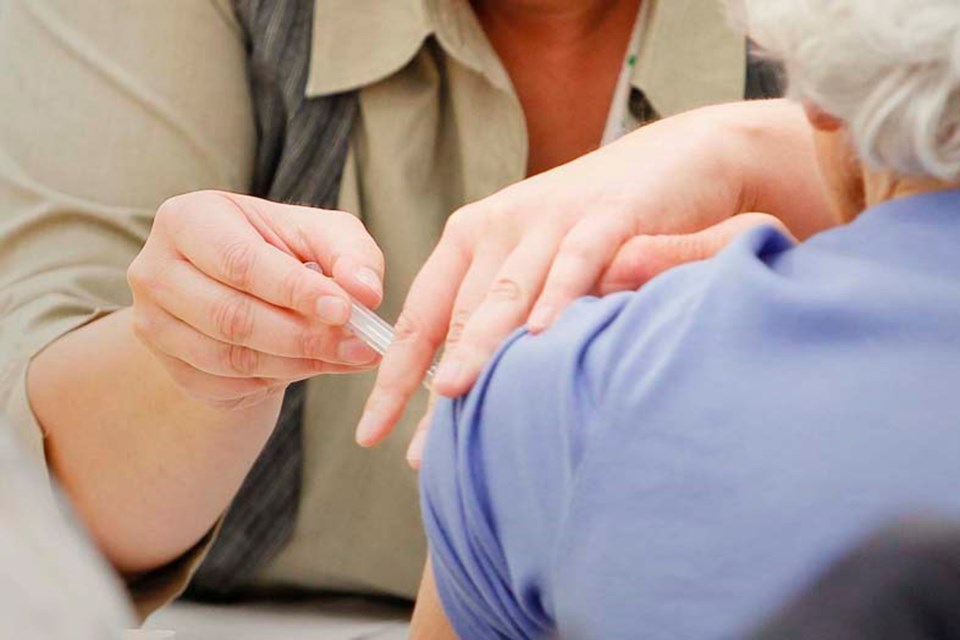Alberta Health Services has confirmed measles exposure in St. Albert and Edmonton is believed to have started with a child at a St. Albert daycare.
On Feb. 6 health officials sent a letter to parents and daycare staff at the Kids and Company St. Albert Grandin daycare warning that people at the daycare on Jan. 29 may have been exposed to measles.
“In the coming days, staff from Alberta Health Services Public Health will be in contact with all staff and all families from Kids and Company St. Albert Grandin to provide additional information and direction,” the letter reads.
Dr. Grazia Slavo, medical health officer, told the Gazette the case is travel-related.
“This was travel acquired, and when (the child) came back they had symptoms that were consistent with measles,” she said.
Slavo said she wasn’t able to comment on how many people may have been exposed at the daycare, but those who may have been affected will receive a phone call from health officials.
“We’ve been contacting them personally via phone numbers to let them know that they’ve been exposed, to let them know what symptoms they need to look out for, and if they qualify within the time period we are offering that preventative medication.”
She said she wasn’t able to confirm whether or not the child had received the measles vaccine.
Lorissa Zollinger, area manager for Kids and Company daycare, said they are working closely with AHS officials to monitor potential symptoms.
"Everybody needs to follow the recommendations set out by AHS, follow their lead, and be mindful of any signs or symptoms," Zollinger said.
Measles is a highly contagious viral infection that is easily spread through the air by sneezing and coughing, and by direct contact with someone who is infected.
Symptoms of measles include a fever of 38.3 C or higher, a cough, runny nose or red eyes, and a red rash that appears three to seven days after fever starts.
“Whenever physicians see children with these symptoms, that’s when it usually clicks that it might be measles,” Slavo said. “The symptoms are not specific to that disease because there are a lot of viral rashes that do go around, but with the travel history, that’s when they decide to test for measles.”
The virus can survive two hours after the contagious person has left the space, AHS said. Symptoms can appear within five to 21 days of being exposed.
On Thursday, AHS released the following list of dates and locations where people may have been exposed to the infectious illness in St. Albert and Edmonton:
- Jan 31: Real Canadian Superstore (101 St. Albert Trail) from 2 to 5 p.m.;
- Jan 31: Chapters (445 St. Albert Trail) from 3:15 to 6 p.m.
- Feb. 2: Mercato (120 Bellerose Drive) from 11 a.m. to 2 p.m.
- Feb. 3: University of Alberta Hospital, main floor (8440 112 Street NW, Edmonton) from 5:30 to 9:30 p.m.
- At the gift shop, information desk and immediate surrounding area; main cafeteria; north elevators across from the info desk and the surrounding area including public washrooms; east hospital entrance, 112 street and foyer area including escalators; main hallway from the 112 street entrance through to the Stollery and adult emergency rooms; main floor area around the McMullen Gallery
- Stollery Children's Hospital, emergency department, from 5:30 to 9:30 p.m.
Individuals who were exposed on Feb. 2 and Feb. 3 in the locations and timeframes noted, and who have either no history of receiving any measles-containing vaccine, or who are pregnant, immune compromised or under one year of age, are advised to call Health Link at 811.
Those who were exposed on dates before Feb. 1 are no longer eligible for preventative vaccine, however, they are still encouraged to review their immunization history, and call Health Link at 811 for advice.
To test for a potential case, physicians give the patient a nasopharyngeal swab to collect samples from the back of the nose and upper throat. The samples are then sent to the lab for testing.
“That’s how this one was found, and that’s why we’re asking people who might’ve been exposed to look out for those symptoms,” Slavo said. At this point, she said no other people have been tested for measles.
If someone does become symptomatic, they are advised to self-isolate and call the Health Link hotline at 811.
Anyone who is going travelling should look at their vaccination history to ensure they’ve received the vaccine, and check health advisories online for different countries to see the level of potential measles exposure before travelling, Slavo said.
“Not all countries are as lucky as Canada to have such a strong immunization program,” Slavo said. “We know when you have two doses of the MMR vaccine, it’s nearly 100 per cent effective. Not all countries have those resources.”
Infants six months of age to less than 12 months of age are eligible to receive an early dose of the measles-containing vaccine. Children aged 13 months up to 4 years are allowed to receive their second dose of the vaccine prior to travel. Adults born in 1970 or later should also check to see if they have gotten two doses – getting just one can put the individual partially at risk.



